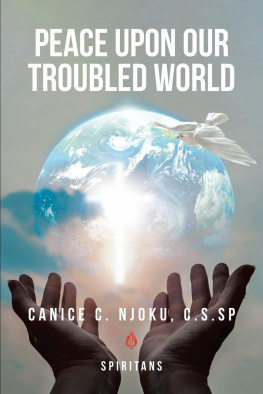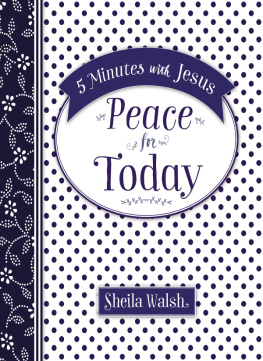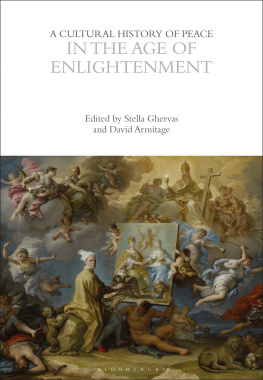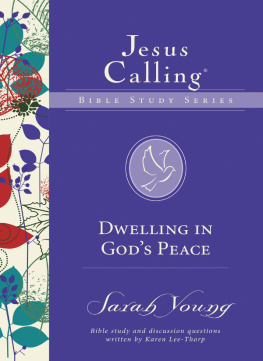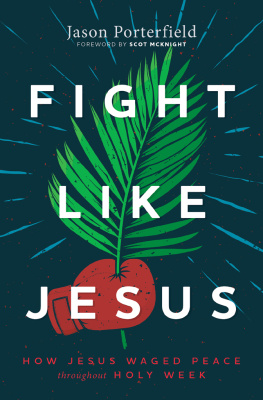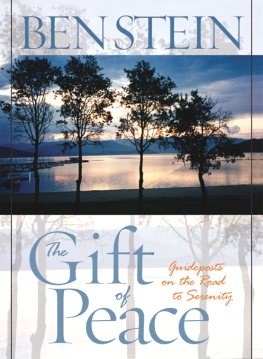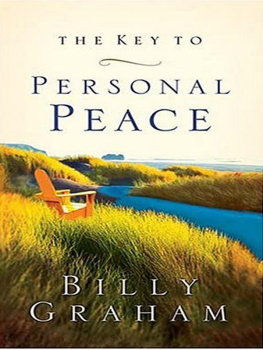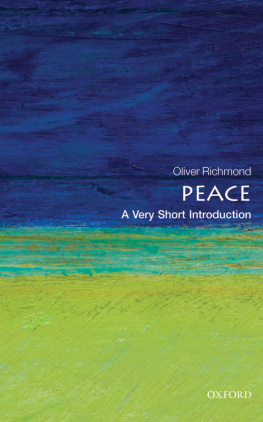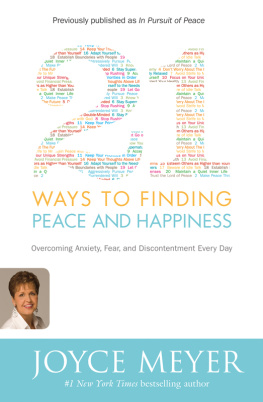Chapter One
Chapter One: General Introduction
The Desire for Peace
O ne of humankinds natural desires, especially at both the individual and family level, is to live a peaceful and peaceable life with oneself, with others, and with ones environment. In a world full of conflicts of every kind, peace is on everyones heart, mind, and lips. In such a world, children grow up full of tension, and there is increasing anxiety in problematic or broken families. Adolescents compete for jobs that are scarce and opportunities that are rare in life. Adults are anxious about meeting their needs. There are ongoing struggles between the rich and the poor, the dominant and subaltern castes, the oppressive males and the suppressed females (trying to make a point through various liberation movements), and warring ethnic and religious groups. Unfortunately, millions of immigrants and refugees are struggling for identity and survival in strange lands under very strange, harsh, and cruel conditions.
Although frantic efforts have been made over the years through various initiatives in order to achieve a lasting peace in the world, this peace keeps eluding the individuals, families, communities, states, and the whole world. Ordinarily, one would expect that with the discovery and invention of means (through science and technology), which make life easier and more meaningful, that humanity would enjoy more peace than ever before. Unfortunately, it has not been so. In some cases, these new discoveries and inventions have become the scotch of humanity and our world.
Efforts have been made to foster peace through retaliatory violence. Unfortunately, rather than alleviate humankinds alienation from peace, these efforts and their modus operandi have proved that madness cannot and should never be attempted to be cured with greater madness. Yes, at times the war is won, but the truth which reverberates in the conscience of humankind is that the peace is never won. Hence, the application of the just war theory as first propounded by St. Augustine (354430) and later outlined and further developed by St. Thomas Aquinas (12241274) in his Summa Theologia has not sufficed at all. The United Nations Organization (UNO) and other world bodies have sought to foster peace through different legislations. Yet these efforts appear like water poured on a rock. Douglas Roche, a former Chairman of the United Nations Disarmament Committee, has proposed the culture of peace as a means of achieving peace in the world. He notes that:
in a world where our destinies are increasingly held in common, a culture of peace can bring genuine hope for the many millions who need and want to be lifted up from the horrors of daily life. We must build a just world if humanity is to survive. And that survival calls us to reject out of hand the cynicism and despair that crushes hope and vision. A culture of peace is at its core, an ethical approach to life. (Douglas Roche, 2003:14)
In spite of all these efforts and desire for peace, more and more tensions continue to mount. So as technology advances more sophisticated devices make their way into the society and world. In light of this, there is lack of trust among nations, and the threat to security of lives and properties continues to be endangered.
A time of complete peace and harmony among men is really a major theme in the sacred scriptures. The Old Testament gives us heartening prophecies about peace. Both Isaiah and Micah paint a graphical picture of peace when they prophesy that, They shall beat their swords into ploughshares and their spears into pruning hook: nations shall not take up swords against nations; neither shall they know war any more (Isa. 2:4; Mic. 4:34). The psalmist also tells us that God makes wars cease to the ends of the earth; He breaks the bow and shatters the spearbe still and know that I am God (Ps. 46:911). Also, the New Testament contains quite a good number of references on the need and promise of peace to the world (Luke 2:14; John 14:27; Acts 2:4445). Whether this all-encompassing peace is attainable in todays chaotic world remains the question scholars and leaders are still struggling with, with no clear answer or solution in close view. So, what is our fate, and the fate of our world? Is there no hope at all?
Communal conflicts are the order of the day in the developing parts of the world. Hardly would a day pass by without the news of one community or nation fighting the other be heard. Such news has become a normal thing . In some cases, it is a welcome development for some nations. This is because it is usually an opportunity to boost their economy through arms deals. It keeps the world news media going in their business. The more bad news the longer they will remain in business and relevant through their reporting. Peace initiatives of different states in order to quell the ever-increasing human conflicts have not always succeeded, as most times their efforts are punctured and punctuated by agents and nations whose economy is boosted during wars and conflict around the world. So, rather than help to attain peace in war or conflict-ridden places, they do everything possible to escalate it.
The individual and the family on its own part are not at peace. This is because the society and the world around them have failed to provide the conducive milieu required for peaceful living. Thus, the individual lives in fear, confusion, anxiety, despair, and absolute hopelessness, being himself helpless. Many have turned to religion and other systems, thus, to some extent, affirming the claim of Karl Marx (18181838) that religion is the opium of the masses (Communist Manifesto, 1848). Some even turn to drugs and other forms of gratifications in order to find peace both within and outside of themselves. Unfortunately, they have always been disappointed.
Christians in the world who are supposed to be the light and salt of the earth (Matt. 5:13), at least when it comes to matters of peace, have themselves been trapped in the same dilemma. Although they profess peace and share the kiss of peace , one finds that they live in fear and uncertainty. Unfortunately, many Christians are yet to experience true peace because they have not accepted the peace which Jesus gives, so peace continues to elude them. Little wonder, the prophet Hosea proclaims, My people are destroyed for lack of knowledge (Hosea 4:6). So, just as it is the desire of most people in the world to live peacefully, Christians are specially charged to champion the course. Until this is achieved, fear, confusion, and uncertainty will continue to rule. The peace that Jesus gives will enable all who embrace it to live successfully in this chaotic world.
Jesus, more than ever, continues to break the barriers in order to offer humankind his peace anew. As a caring and loving master, he reads our moods and situations and is ever ready to help humanity fill the lacuna orchestrated by the deficiency of peace. He says to humanity, Listen! I am standing at the door, knocking; if you hear my voice and open the door, I will come in to you and eat with you, and you with me (Rev. 3:20). The offer of peace is the offer of life. The inhabitants of the world have the option of accepting or rejecting it. So the choice is humankinds (Deut. 30:15).
The Quest for Peace: Problematic or a Lost Battle?
Continuous and ever-increasing fear, anxiety, hopelessness, and uncertainties have characterized the existence of most of todays world inhabitants who, in spite of their religious profession of faith, are still very frigid. Peace seems to be far away from them and most have resigned to fate, as was the situation of the Jesus disciples when their master was crucified. So rather than be at the forefront for the quest for peace, most Christians have withdrawn and lapsed into a hiding mode. The lit candle and the presumable light of the world now lies hidden under the table. The salt of the earth has lost its taste, while the world is starved of true peace that it so much desires. Instead of becoming a giant factor in peace issues , most Christians ignite hatred and resentments.

